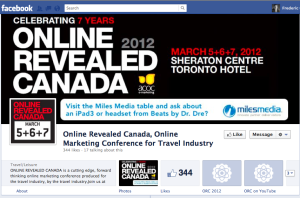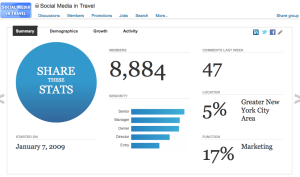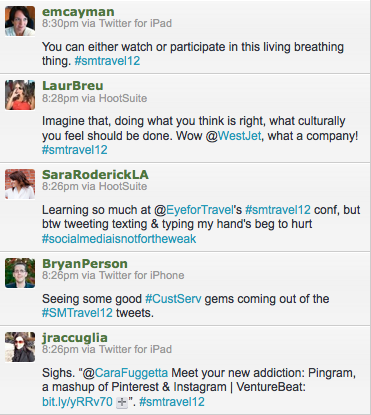It’s that time of year when many great conferences come around and, unless you’ve got deep pockets and plenty of time on your hands, it’s simply unrealistic to attend them all. For example, this week marked the 7th edition of Online Revealed Conference (ORC 2012), three days during which everybody and anybody interested in travel marketing, Canada and its tourism industry were together in Toronto to learn, exchange and discuss today’s challenges and tomorrow’s threats & opportunities.
With the vanishing of Canada e-Connect, which was its leading annual e-tourism strategy summit, ORC thus becomes the de facto go-to conference in Canada if you are interested in digital tourism strategy and marketing.
Travel Conferences Coming Soon
At the same time, the folks at Eye for Travel were organizing their 5th edition of Social Media Strategies for Travel conference, held in San Francisco. New this year was also a dedicated track called Mobile Strategies for Travel, highlighting the importance for the hospitality industry to embrace social, local AND mobile, along with its rapid pace of evolution.
And with the upcoming smorgasbord of seminars and shows to take place at SXSW, in Austin, Texas, it becomes nearly impossible to keep track of all the quality content out there. So how does one “attend” such conferences without actually being on the premises? Well, you can follow these six tips:
1. Facebook pages
 Most annual conferences seek to maintain a presence online throughout the year, and so a Facebook page is quite common. Participants can post questions to speakers, ask logistics questions to event organizers, who in turn can reply by sharing pictures, how-to videos, etc. See here for SXSW’s Facebook page, which is followed by over 200,000 fans.
Most annual conferences seek to maintain a presence online throughout the year, and so a Facebook page is quite common. Participants can post questions to speakers, ask logistics questions to event organizers, who in turn can reply by sharing pictures, how-to videos, etc. See here for SXSW’s Facebook page, which is followed by over 200,000 fans.
2. LinkedIn Groups
 The Groups feature in LinkedIn was once the golden standard, until it became a haven for spammers who just come in to spin their sales pitch. Still, there are a few gems out there, with moderators who effectively monitor conversations and delete the unnecessary noise. One such group is “Social Media in Travel” group, created back in January 2009 by Gina Baillie, at Eye for Travel.
The Groups feature in LinkedIn was once the golden standard, until it became a haven for spammers who just come in to spin their sales pitch. Still, there are a few gems out there, with moderators who effectively monitor conversations and delete the unnecessary noise. One such group is “Social Media in Travel” group, created back in January 2009 by Gina Baillie, at Eye for Travel.
With close to 9,000 members and consistently growing, it’s a great place to have discussions on varied topics around social media, online distribution, mobile and customer loyalty as it relates to the travel and hospitality industry. If you have ever attended any of the web-based summits organized by Social Media Examiner, you will see how they also actively use LinkedIn Groups to kickstart discussions and get attendees engaged before the seminars even begin.
3. Event hashtag – pre, during, post
 Nowadays, any event or conference that is in tune with its social media users has a Twitter hashtag associated to it. A hashtag acts as a keyword, thus helping to monitor content relating to the event when using Twitter or third-party applications such as Hootsuite, Tweetdeck, or Seesmic. For example, the hashtag #smtravel is used throughout the year by folks sharing thoughts, articles, breaking news, or studies related to social media in the travel sphere.
Nowadays, any event or conference that is in tune with its social media users has a Twitter hashtag associated to it. A hashtag acts as a keyword, thus helping to monitor content relating to the event when using Twitter or third-party applications such as Hootsuite, Tweetdeck, or Seesmic. For example, the hashtag #smtravel is used throughout the year by folks sharing thoughts, articles, breaking news, or studies related to social media in the travel sphere.
This week, as the conference begun, you could zero-in more precisely on real-time content with attendees tweeting using the hashtag #smtravel2012. Likewise, attendees, speakers and organizers at Online Revealed Canada were using #ORC2012 throughout the week. Even after the event unfolds and people pack their bags, the hashtag can continue to live on with post-mortem blog posts, news or summaries made available. Keep an eye out or monitor the hashtag, and you can come up with some quality content when you least expect it.
4. Review the agenda & Prioritize time slots
While it’s great that most events have their own hashtag, if you are at work or running between meetings and decide to eavesdrop on the online conversation, it will feel more like chaos than music. For optimal results, act as if you were attending the conference and take a few minutes to take a closer look at the agenda.
If there is a topic or content track you’d like to attend, set some time aside from your busy day in order to properly monitor what will be said and relayed during that keynote. Then, and only then can you actively take part in the “virtual” conference. If tweets aren’t as fluid and pertinent, take that time to browse backwards in time to see what you’ve missed.
5. Participate in the discussion
 Is it OK to tweet content, retweet or comment on an event hashtag without actually attending it? Absolutely. In fact, it’s actually what Brian Solis refers to when he says conference speakers no longer talk at audiences, but rather through them, in order to speak to audiences of audiences.
Is it OK to tweet content, retweet or comment on an event hashtag without actually attending it? Absolutely. In fact, it’s actually what Brian Solis refers to when he says conference speakers no longer talk at audiences, but rather through them, in order to speak to audiences of audiences.
If you want to make the most of these opportunities, retweet quality quotes, ask questions when a comment seems out of context or you’d like to know the source for breaking-new statistics unveiled during a keynote. What you don’t want to do is to spam an event hashtag, as unfortunately is often the case. That’s just plain stupid. Period.
6. Contact event organizers a posteriori
Finally, many event organizers make parts or all of the conference contents available for purchase and visioning after the event has come and gone, assuming there was audio and video caption taking place. So if you’ve followed the above tips, you will probably have a good idea of which keynote seems to have been a hit, or a presentation you’d like to see entirely, without interruption.
Because truth be told, even if you follow closely conversations through an event hashtag, it will never come anywhere close to actually attending it and having the benefit or real-life presence from a speaker, with a proper intro, back-up slides and video props. Not to mention the networking that takes place during coffee breaks, over lunch and during evening receptions or ice-breakers. Still, that’s no reason why you shouldn’t at least gain some insights even if you can’t fly to Toronto, San Francisco, Austin or wherever that next awesome conference is bound to be…









Leave a Reply